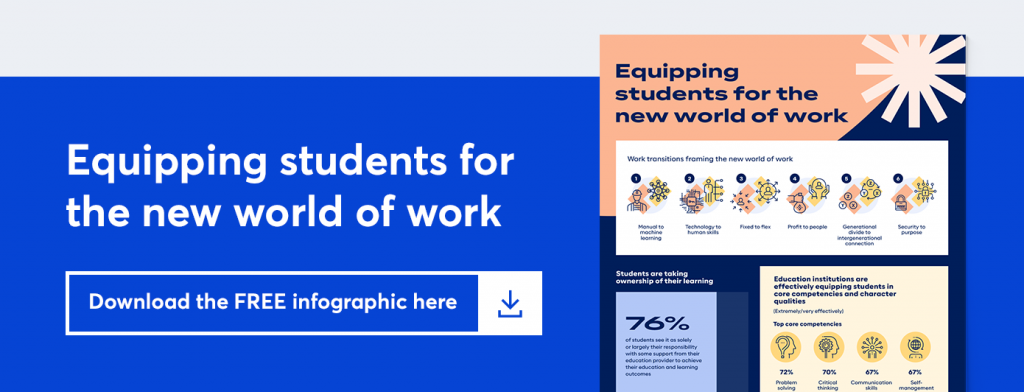By: McCrindle
The world in which educators are preparing students for is changing, and so too are the students themselves.
Generation Z have an entrepreneurial mindset, are looking to work with flexibility and are ready to embrace the new world of work – which is a good thing considering the average school leaver could have 18 jobs across six careers over their working life. Understanding the students of today and their perspective is key to understanding how this new generation of workers will reshape the workforce with their perceptions and expectations.
Gen Z Feel the Tension Between Income and Passion
The key desires that students today consider to be extremely or very important as they think about their career include having purpose and meaning in their work (72%), doing work that aligns with their core values (68%), finding a workplace that is a community of strong social connections (68%), that the work they do has a positive impact on the world around them (64%) and workplace flexibility (64%).
While these desires shape their expectations around work, students still say the amount they earn matters to them. For almost two thirds of students (63%), the amount they earn matters more to them than working in an area they are passionate about. For 37% however, working in an area they are passionate about matters more to them than the amount they are able to earn. Females are more likely than males to prioritise working in an area they are passionate about over finances (42% compared to 33%).
Most Students Have an Entrepreneurial Midset
An entrepreneurial mindset is evident among this generation, with almost nine in ten students (86%) anticipating that they will work in something they have started on the side. This could be solely as an entrepreneur (11%), mainly as an entrepreneur but also working as an employee on the side (27%) or mainly as an employee but working in something they have started on the side (48%). Just 14% of students say their ideal employment situation is to be an employee only. Males (46%) are more likely than females (31%) to have their ideal employment situation as one that is predominantly being an entrepreneur.
Traditional ways of working are being reshaped by Generation Z. Organisations would be wise to prepare themselves for this new cohort of workers who are bringing new paradigms and perspectives to what work will look like in the future.
Hybrid Workplaces are the Way of the Future

In keeping with their desire for mobility and flexibility, the emerging workforce (82%) are more likely than Australian workers (62%) to describe their ideal working situation as a hybrid one. Just 10% describe their ideal situation as everyone working from the workplace all the time, compared to 25% of Australian workers. While today’s students are yet to experience the benefits and challenges of their current perspective, it highlights that there is indeed a shift in expectations from fixed to flex in the future of work. The next generation of employees are unlikely to engage with more traditional workplaces that are not willing to adapt and engage the next generation of talent coming through.
Flexibility is the Key Opportunity for Students Today
With a strong desire for hybrid work, students see a flexible working lifestyle (60%) as the greatest opportunity ahead of them. This is followed by productivity and benefits that come from technology (47%) and career mobility (47%). While many educators who are already in the workforce view the future as challenging, today’s students have grown up in a world that has shaped and prepared them for it. So much so, that career mobility (47%), increasing workforce diversity (45%), emerging industries and diverse careers (44%) are seen as opportunities. Alongside the opportunity to create a more equitable society (44%) and building a globally sustainable future (36%).
Students are positive about the future and ready to embrace it
Today’s students are a global generation who care deeply about social issues and are passionate about doing work that matters. With an entrepreneurial mindset, their propensity for self-directed learning means they are taking responsibility for their education and are ready to use it to set themselves up to thrive in the future. What many older generations see as obstacles, this generation see as opportunities. As the world of work changes, students intend to use the transitions into the new world of work to their advantage. Positively, their unique childhood and context has shaped and prepared them to thrive in this new world of work.
Article supplied with thanks to McCrindle.
About the Author: McCrindle are a team of researchers and communications specialists who discover insights, and tell the story of Australians – what we do, and who we are.
Feature image: Photo by Jason Goodman on Unsplash

